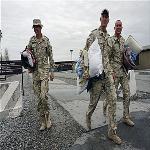15 September 2010

Photo: AP
US servicemen walk at the US air base in Manas, near the capital Bishkek, Kyrgyzstan, in Apr 2010 (file photo)
For American soldiers of the 101st Airborne, Manas Air Transit Center is a welcome patch of America in the heart of Central Asia. Two hours away is their ultimate destination - the battlefields of Afghanistan. Manas offers a flying gas station for American pilots. Drawing from bladders containing 5 million gallons of fuel, tankers from Manas fuel jets over Afghanistan, eliminating the need to ever land in the mountainous nation.
Manas Air Transit Center provides key location
Taliban attacks on trucks coming along the southern route, through Pakistan, have made the northern air route - through Kyrgyzstan - increasingly valuable.
Colonel Dwight Sones, the Manas Center commander, said "Kyrgyzstan in itself is really the crown jewel of Central Asia, in terms of its location, its sphere of influence with the surrounding countries."
In mid-June, though, just as Colonel Sones arrived here, ethnic Krygyz and ethnic Uzbek turned on each other in Osh, about 320 kilometers away. Hundreds died. In the past, Kyrgyz political passions have turned against the U.S. base. Last year, the Kyrgyz parliament voted 78 to one to expel the Americans.
Politics at play in region
Washington turned the situation around by nearly quadrupling the annual rent, to $60 million.
Kyrgyz scholar Alisher Khamidov said politicians are turning the American base into a political football prior to the October 10th elections. "These parties are agitating again for kicking the base out. They are arguing, 'Look this Western presence is the cause of all our troubles.' I have seen some politicians calling for the eviction of this base, with the hope, with the expectation that Kyrgyzstan will regain its stability, and its sovereignty," said Khamidov.
Opposition also comes from Russia. Moscow ruled Kyrgyzstan from 1876 until 1991, when the Soviet Union collapsed. Today, Kyrgyzstan is the only nation in the world to host both an American and a Russian base. Leonid Bondarets is an advisor for the Russian base at Kant, only 40 kilometers from the American base.
Bondarets said the U.S. base opened in 2001 on a temporary, one-year lease. He sees it as part of a larger American plan to strengthen its position in the region, with access to oil and gas in Central Asia and minerals in Afghanistan.
Russia retains a lot of influence here. Most people over 30 speak Russian. One fifth of Kyrygz workers work in Russia. The money they send home to Kyrgyzstan is a valuable economic lifeline for this impoverished, landlocked nation of 5.3 million people.
US makes extra effort to help
Americans at Manas are working overtime to win local hearts and minds. American money is digging wells, roofing schools, buying local crafts, and building a women's shelter. Base commander Colonel Sones said, "We have the social side. We take the uniforms off, get in sports attire, play volleyball, soccer, go see a ballet, meet the mayors. That is all part of that team building."
Valentin Bogatyrev, a political analyst in Bishkek, has never visited the Manas base, but he senses that Kyrgyz' attitudes are softening toward the U.S. presence. He said mainstream politicians are starting to value the base for contributing to the national budget, for development projects, for upgrades to Bishkek's international airport, and for employing 900 local workers.
So in the roller coaster that is Kyrgyz politics, the United States is gambling that goodwill and dollars will carry the day, keeping open this vital back door to Afghanistan.